   
CEO Picks - The best that international journalism has to offer!
 S30 S30Combining two types of molecular boron nitride could create a hybrid material used in faster, more powerful electronics   In chemistry, structure is everything. Compounds with the same chemical formula can have different properties depending on the arrangement of the molecules they’re made of. And compounds with a different chemical formula but a similar molecular arrangement can have similar properties.Graphene and a form of boron nitride called hexagonal boron nitride fall into the latter group. Graphene is made up of carbon atoms. Boron nitride, BN, is composed of boron and nitrogen atoms. While their chemical formulas differ, they have a similar structure – so similar that many chemists call hexagonal boron nitride “white graphene.”
Continued here
|
 S1 S1
 S2 S2
 S3 S3Can Facebook Ever Be Fixed?   For those paying attention to privacy scandals and data leaks over the last few years, Facebook has emerged as a leading culprit. From its 20-plus scandals of 2018 (yes, someone actually counted) to an actual spyware app the company paid users to download to downright disastrous security practices exposed earlier this year, the company can’t seem to get much right. Which is why the recent post (which the Washington Post also ran) in which Facebook CEO Mark Zuckerberg proposes four new ideas to regulate the internet should come as no surprise. That Zuckerberg might fall short, yet again, in offering meaningfully changes in the way his company collects, stores, or analyzes its users’ data is to be expected. Broadly speaking, Zuckerberg’s latest proposals are mostly superficial when compared to the scale and the scope of the problems Facebook is confronting.
Continued here
|
 S4 S4How Digital Currencies Can Help Small Businesses   Small businesses have largely been ignored during the debate over digital currencies, even though they’re a hugely significant part of the U.S. economy and have much to gain from cheaper, more efficient payment systems. These businesses work with small margins, have less bargaining power than large companies, and suffer from cash flow problems as they wait to be paid for goods and services. Stablecoins and central bank digital currencies can help. These technologies can reduce payment processing costs, allowing small businesses to keep more of what they earn, and significantly accelerate how quickly they get paid. This could drastically improve small businesses’ liquidity and cash buffers, and help them survive negative economic shocks and thrive.
Continued here
|
 S5 S5How to Sell Your Ideas up the Chain of Command   You have a great idea—a product tweak that will save your company money, a process change to increase your team’s productivity, or a plan for heading off a looming crisis. There’s just one snag: You’re not sure how to approach your boss about it, or worse, you’ve tried and failed to get the attention of higher-ups.
Continued here
|
 S6 S6You Can't Be a Great Manager If You're Not a Good Coach   If you have room in your head for only one nugget of leadership wisdom, make it this one: the most powerfully motivating condition people experience at work is making progress at something that is personally meaningful. If your job involves leading others, the implications are clear: the most important thing you can do each day is to help your team members experience progress at meaningful work.
Continued here
|
 S7 S7Fire, Snowball, Mask, Movie: How Leaders Spark and Sustain Change   What does it take for an average manager to become a highly effective leader? There are countless books, models, and formulas for success. But the truth is that leadership transformation is deeply dependent on circumstances. The key for those who seek it is to absorb the insights that can be drawn from the successful experiences of others. During their in-depth study of seven CEOs, Fuda and Badham uncovered seven interdependent metaphors, which they went on to test with more than 10,000 managers on four continents. The authors discuss four of those metaphors—fire, snowball, mask, and movie—here, in the context of individual managers’ experiences.
Continued here
|
 S8 S8Leading Across Cultures Requires Flexibility and Curiosity   How many nights have you spent in a hotel in a city many miles from home? Perhaps nervous about the meeting in the morning, you find yourself lying on the bed flicking through the TV channels for something to watch to keep you awake to offset the growing jet-lag. Automatically, you search for channels and movies in your own language.
Continued here
|
 S9 S9The Reinvention Imperative   “Failure isn’t fatal, but failure to change might be.” Those are the words of John Wooden, the legendary UCLA basketball coach, who won 10 NCAA national championships in just 12 seasons because of his ability to constantly adapt—to new players, new rivals, and new styles of play. In business, too, leaders are continually faced with […]
Continued here
|
 S10 S10Balancing Competing Loyalties   How do professionals convince their employers or clients that they’re loyal? New research finds that to give the impression of uncompromising loyalty to their current role, professionals often become contentious and aggressive toward former collaborators. The problem is, such behaviors can hurt the same stakeholders they’re trying to win over.
Continued here
|
 S11 S11 S12 S12Please Don't Hire a Chief Artificial Intelligence Officer   The effective deployment of AI in the enterprise requires a focus on achieving business goals. Rushing towards an “AI strategy” and hiring someone with technical skills in AI to lead the charge might seem in tune with the current trends, but it ignores the reality that innovation initiatives only succeed when there is a solid understanding of actual business problems and goals. For AI to work in the enterprise, the goals of the enterprise must be the driving force.
Continued here
|
 S13 S13Competing on Analytics   Companies questing for killer apps generally focus all their firepower on the one area that promises to create the greatest competitive advantage. But a new breed of organization has upped the stakes: Amazon, Harrah’s, Capital One, and the Boston Red Sox have all dominated their fields by deploying industrial-strength analytics across a wide variety of activities.
Continued here
|
 S14 S14How to Handle Silence, the Worst Kind of Feedback   Last week I shared the problem of Alex, a marketing consultant who was left in the dark when Sam, a prospective client, didn’t call him back. My suggestion to Alex was to reach out to Sam once and then let it go. In that situation Alex and Sam didn’t know each other well (they had […]
Continued here
|
 S15 S15Three Ways to Cope with a Looming Layoff   I’ve been surprised by the number of people I’ve met who, like I did, quit their jobs after the recession took hold last year. Of course, most people don’t want to quit — or can’t. For many of those job-keepers, the prospect of layoffs is all too real, even as the recession officially winds down. They want to know what they can do in the face of the ongoing threat, and my fellow blogger Daisy Wademan Dowling provides useful tips in her post “How to Sell Yourself When Your Job’s at Risk.”
Continued here
|
 S16 S16When It's Wise to Offer Volume Discounts   On the way to a recent barbecue, I dropped by a local gourmet market to pick up ingredients to make my famous Korean-style ribs. While the butcher was initially thrilled with my unexpectedly large 30 pound order, his mood soured when I asked him to thinly slice the ribs “flanken style” (cut parallel to the ribs). After 20 minutes of intense slicing (and several reminders to “slice it thinner”), the meat was ornately packaged and ready to go. Then, out of curiosity – let’s call it “research” – I asked if I was entitled to a volume discount since I was buying so much. Without giving it a second thought, the butcher chopped the per pound price from $8 to $6. As a consumer I appreciated the $60 savings—but as a consultant who helps businesses optimize their pricing, I wondered if the butcher realized how much of the store’s operating profit margin disappeared due to his hastily-considered discount.
Continued here
|
 S17 S17Who Has the D?: How Clear Decision Roles Enhance Organizational Performance   The culprit? Ambiguity over who’s accountable for which decisions. In one auto manufacturer that was missing milestones for rolling out new models, marketers and product developers each thought they were responsible for deciding new models’ standard features and colors. Result? Conflict over who had final say, endless revisiting of decisions—and missed deadlines that led to lost sales.
Continued here
|
 S18 S18How to Steer Clear of Groupthink   Research has shown that consensus-based problem-solving groups are often where innovative ideas go to die. These groups are highly prone to groupthink — quick agreement around status quo solutions with little discussion or deliberation. So how can managers help their teams keep fresh ideas alive? Researchers studied four virtual task forces that were set up to recommend a process to make Americans’ health care records electronic. They found that the groups who avoided groupthink followed three steps: 1) They challenged the status quo; 2) They adopted a placeholder solution that allowed them to agree on broad principles even if they disagreed on the details; and 3) They celebrated progress towards a final agreement, which allowed them to maintain morale and momentum.
Continued here
|
 S19 S19From Vision to Reality: How OKRs Are Reshaping Team Goals in 2024 | Benjamin Laker   The winter 2024 issue features a special report on sustainability, and provides insights on developing leadership skills, recognizing and addressing caste discrimination, and engaging in strategic planning and execution.The winter 2024 issue features a special report on sustainability, and provides insights on developing leadership skills, recognizing and addressing caste discrimination, and engaging in strategic planning and execution.In an era marked by rapid technological advancements and a dynamic shift in workplace cultures, teams’ ability to collaboratively set, pursue, and achieve corporate goals has become more critical than ever. This evolution reflects a deeper understanding of the importance of collective effort and a shared vision of achieving success.
Continued here
|
 S20 S20Business in Russia: Why some firms haven't left   When the first airstrikes fell on Ukraine in February 2022, corporate executives with operations or holdings in Russia were forced to pick a side. This decision had significant implications. Russia remains a major business market, with a population of 145 million; its 2022 GDP was a staggering $2.24tn (£1.81tn), right behind France. Fleeing companies would leave a lot of revenue on the table.Yet amid a gruelling war, with tens of thousands of civilian casualties and widespread international condemnation of Russia, companies risked severe reputational damage by staying put. Plus, a mix of international pressure, sanctions and risks of Russian government interference offered strong reasons for companies to leave when the conflict began.
Continued here
|
 S21 S21Why employers are stingy with job-interview feedback   Photographer Allison Hunter interviewed in August 2023 for a position taking photos of an historical archive's collections. During the conversation, she asked the hiring panel for feedback – how did she stack up against other candidates?The question was not well-received. "Shaming is a bit heavy to say, but it was a little like scolding," says Hunter, who is based in New York City. "'Oh no, we wouldn't tell you that'," she recalls the panelists saying. "'Just know that your resume has gotten you this far, and this is a very competitive position'."
Continued here
|
 S22 S22Are Jains the original vegans?   Although the term "vegan" was coined nearly 80 years ago by the British animal rights advocate Donald Watson, it is only in the last couple of decades that veganism (and Veganuary, the month long challenge to eat solely plant-based food) has really come into its own as an influential lifestyle trend. However, in many Eastern cultures, the practice of shunning meat as an act of kindness towards animals is ancient, going back more than two millennia.In particular, Jainism, the Indian faith that originated in north India sometime between 5th-7th Century BCE, predating even Buddhism, comes closest to the modern-day vegan principles of avoiding animal products. "Non-violence or ahimsa is the basic principle of life for all Jains," explained Kusum Jain, retired professor of philosophy at the University of Rajasthan. Professor Jain, who has done extensive research as well as advised doctorate students on this subject, added, "This includes all living things – not just human beings, but also animals, insects and sometimes plants, even those living in water or under the earth. For Jains, hurting or harming any living being in any sense is violence."
Continued here
|
 S23 S23The Chosen: The Christian-funded hit about Jesus taking the US by storm   It's one of the most successful crowdfunded entertainment projects ever, with its makers claiming that during four seasons of the series, viewer support raised nearly $100m in production expenses. But the chances are if you're not a US Christian, you might never have heard of The Chosen, the first multi-season series about Jesus of Nazareth, told through the eyes of his disciples and followers, as well as his opponents – as initially it was only available on its own platform, or through other Christian outlets.More like this:- Band of Brothers is the last great 'uncool' TV show- How Gone Girl impacted a shocking kidnapping case- The female drug barons of Latin America
Continued here
|
 S24 S24Oscars 2024: The real reason Barbie's Greta Gerwig and Margot Robbie were snubbed by the Oscars   Being based on a doll really hurt Barbie at the Oscars. Although the film was nominated for best picture, Greta Gerwig was snubbed as director and Margot Robbie left out of the best actress category, omissions that caused a flood of outrage on the internet and from their colleagues. The Associated Press called Gerwig's snub "one of the biggest shocks in recent memory". Some fans took it out on Ken. As USA Today pointed out, quoting a user on X, Ryan Gosling being nominated for supporting actor while Gerwig and Robbie were left out "kind of proves the point of the movie", that the patriarchy is still with us. Gosling, Ken himself, said in a statement: "There is no Barbie movie without Greta Gerwig and Margot Robbie, the two people most responsible for this history-making, globally-celebrated film".More like this:- Gerwig's 'bold, inventive' Barbie breaks the mould- How Barbie subverts our expectations about pink- 'I'm just Ken': How toxic masculinity dominated cinema
Continued here
|
 S25 S25Masters of the Air review: WW2 series is 'gripping' but 'creaky'   In a typically intense scene in Masters of the Air, we are put in the midst of a US bombing mission over Nazi Germany. With dozens of other planes falling from the sky and one of their own engines on fire, a fighter plane's co-pilot thinks it is time to parachute out. The pilot, Major Gale "Buck" Cleven (Austin Butler) grabs him by the arm and yells, "We're going to sit here and take it! You hear me? We're going to sit here and take it!"That scene reveals what is gripping and also what is creaky in the much-hyped series produced by Steven Spielberg and Tom Hanks. Masters of the Air is a big old-fashioned war drama, glossed up with dazzling special effects and stocked with some of today's hottest young actors. It is also full of the kind of earnest, clunky dialogue and swaggering heroes familiar from classic war movies going back to the 1940s.
Continued here
|
 S26 S26 S27 S27 S28 S28Learning to read in another language is tough: how Namibian teachers can help kids  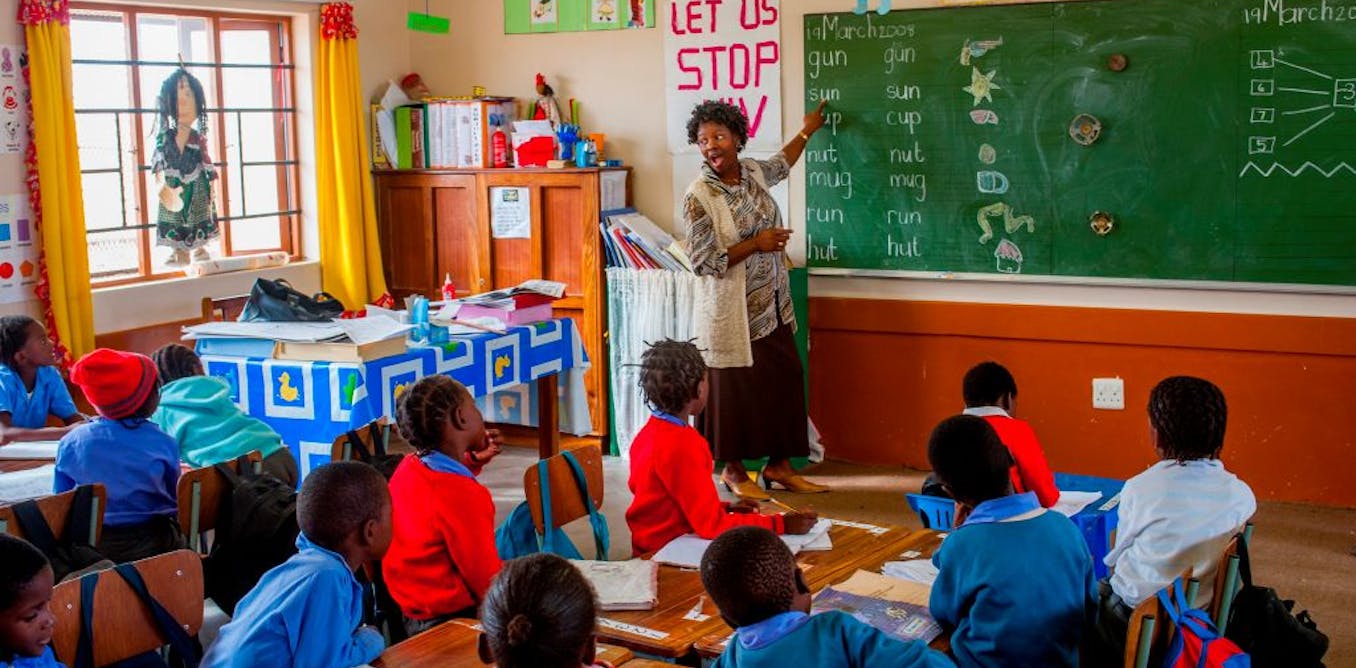 In a classroom in Namibia’s northern Oshikoto region, a teacher has written English vocabulary words on the chalkboard. She asks her learners to read them aloud. When they stumble with pronunciation, she corrects them. She also helps the youngsters to sound out words. At another school nearby, an English teacher is showing her class cartoon strips on her cellphone to help them create mental images while reading – an approach that’s proven to enhance comprehension.These teachers were part of a study we conducted to understand the unique knowledge and skills that Namibian teachers have developed to teach English reading comprehension to grade 7s (who are on average 12 years old) in a diverse linguistic context. The learners’ home languages were primarily Oshiwambo, Oshindonga, Afrikaans and Otjiherero.
Continued here
|
 S29 S29Domestic woes put Kim Jong Un on the defensive - and the offensive - in the Korean Peninsula   On Jan. 14, the North Korean leader presided over the test of a “new solid-fuel hypersonic missile with intermediate range.” Two days later, during a speech at the Supreme People’s Assembly meeting in Pyongyang, Kim declared South Korea “the North’s primary foe and invariable principal enemy.” He also vowed to “purge unification language from the constitution” and called for the destruction of “inter-Korean symbols,” such as the Arch of Reunification monument, which has since been torn down in Pyongyang.Noting that while North Korea does not want conflict, the communist country nevertheless had no “intention of avoiding it.” Kim went on to disclose the North’s plans to “occupy, subjugate and reclaim” South Korea in the event of war.
Continued here
|
 S31 S31Pictures have been teaching doctors medicine for centuries -  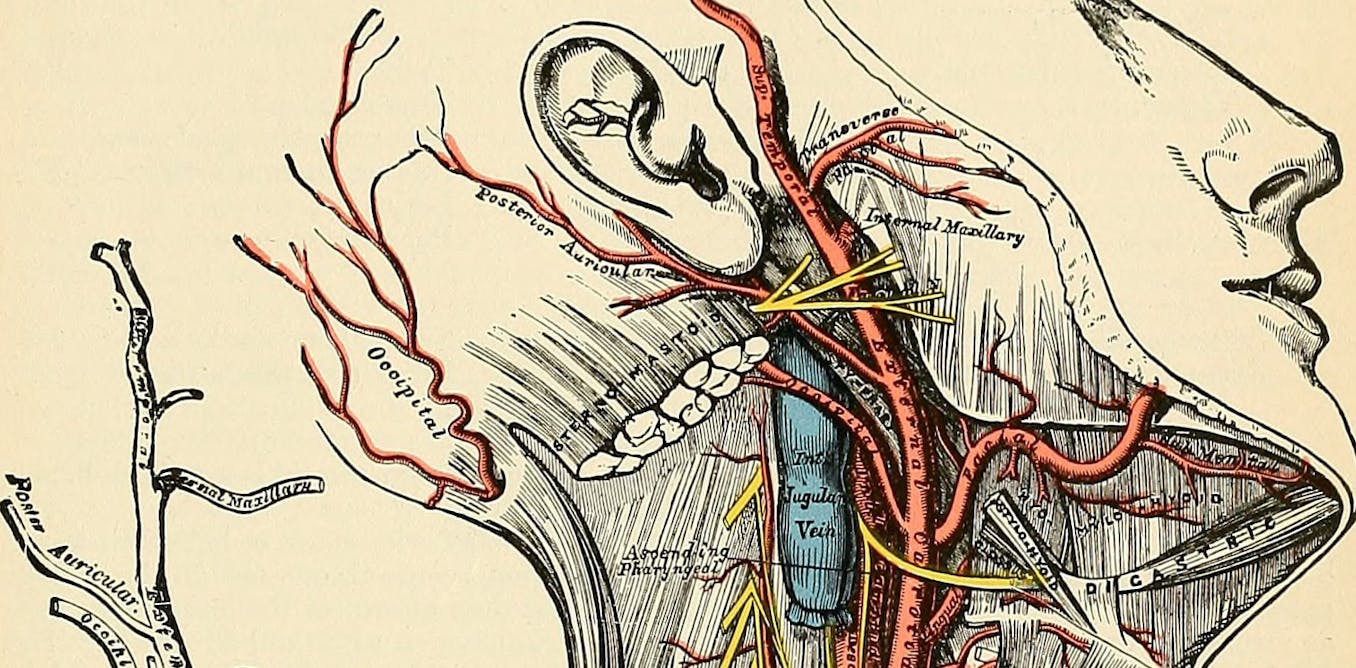 “Medical illustrators draw what can’t be seen, watch what’s never been done, and tell thousands about it without saying a word.”For decades, this slogan appeared on the website and printed materials of the Association of Medical Illustrators. Although the association no longer uses this tag line, it’s still an accurate description of the profession.
Continued here
|
 S32 S32 S33 S33AI in HR: Are you cool with being recruited by a robot? Our studies reveal job candidates' true feelings   Artificial Intelligence (AI) is transforming the human resource management (HRM) industry faster than we notice. Sixty-five percent of organisations are already using AI-enabled tools in the hiring process, but only a third of job candidates are aware of the practice.In recruitment, AI-enabled tools have the ability to collect large amounts of organisational data to search, identify, evaluate, rank, and select job candidates. They can assemble information on hiring needs across teams, generate advertisements with model candidate traits, and highlight potential candidates from a range of digital platforms.
Continued here
|
 S34 S34 S35 S35Humans are depleting groundwater worldwide, but there are ways to replenish it   If you stand at practically any point on Earth, there is water moving through the ground beneath your feet. Groundwater provides about half of the world’s population with drinking water and nearly half of all water used to irrigate crops. It sustains rivers, lakes and wetlands during droughts.Groundwater is a renewable resource, but it can take decades or even centuries for some aquifers to recover after they are depleted. Current understanding of this challenge is based mainly on where and how frequently people record measurements of water levels in wells.
Continued here
|
 S36 S36Debt, wage theft and coercion drive the global garment industry - the only answer is collective action   Major fashion brands including Barbour and PVH (the owner of Calvin Klein and Tommy Hilfiger) have agreed to pay over £400,000 in compensation to migrant workers in Mauritius. These workers from Bangladesh, India, China and Madagascar had been forced to pay illegal recruitment fees and, alongside other indicators of forced labour, were allegedly subject to deception and intimidation. These are the findings from an investigation carried out between 2022 and 2023 by Transparentem, a US-based organisation that investigates workers’ rights.
Continued here
|
 S37 S37What a fair deal for ex-steelworkers would look like as the industry decarbonises  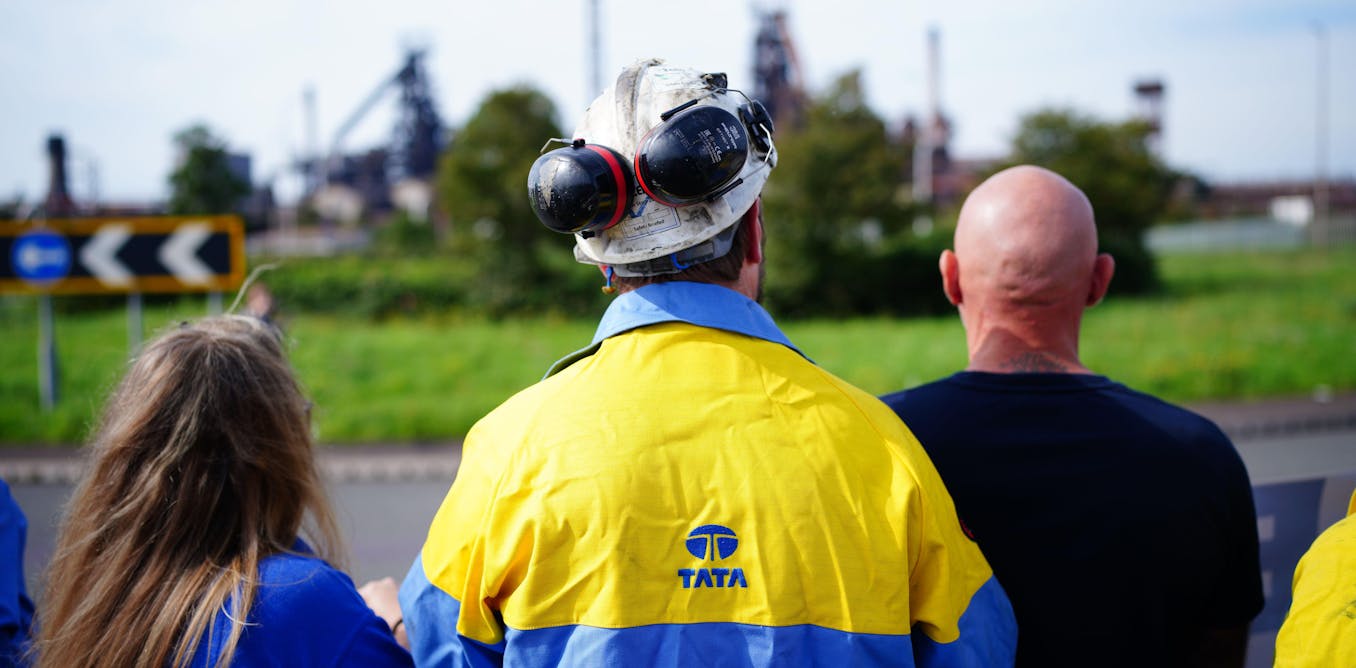 Plans to cut almost 3,000 jobs at the UK’s largest steelworks, Tata Steel in Port Talbot, south Wales, mark another devastating chapter in a long history of deindustrialisation.The closure of steel plants in Ravenscraig, Ebbw Vale and Redcar will be haunting the steelworkers in Port Talbot, serving as a reminder of what is at stake. Although this so-called “restructuring” has sadly become the norm, former workers at other large steelworks are still scarred by loss of income, identity and skills in the post-redundancy transition.
Continued here
|
 S38 S38Training to reduce cognitive bias may improve decision making after all  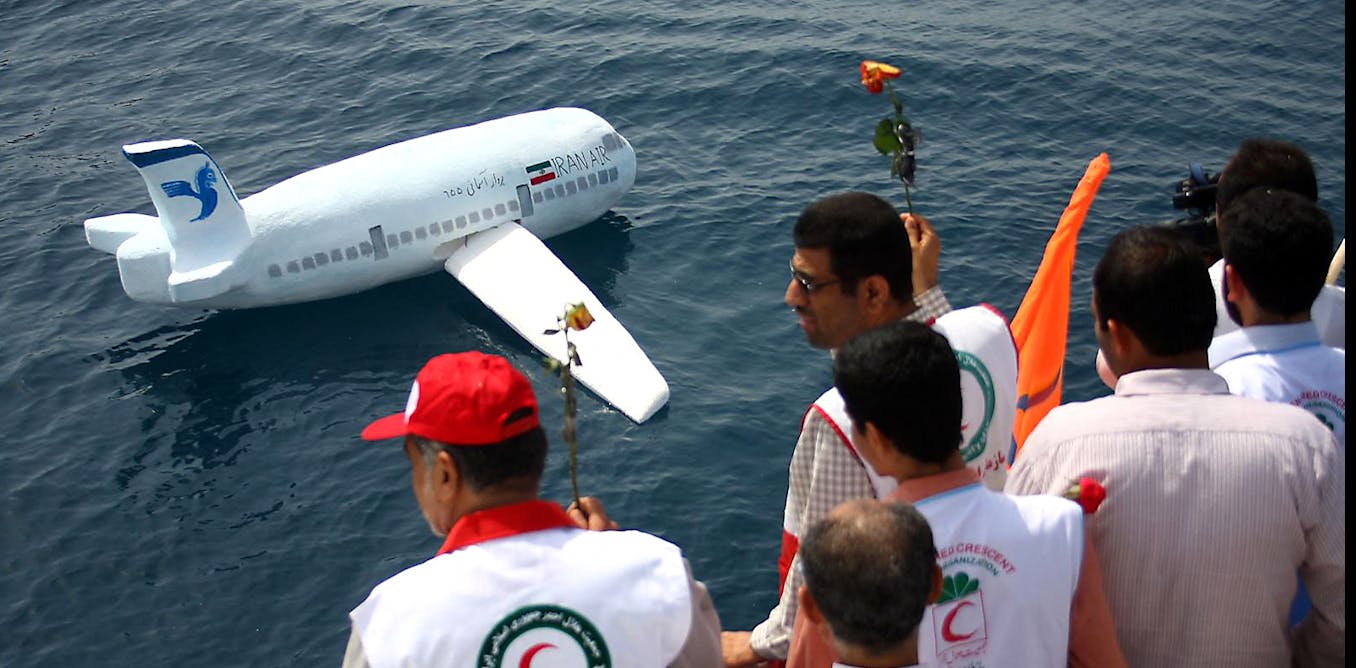 Professeur Associé en marketing et membre du groupe de recherche CNRS-GREGHEC, HEC Paris Business School Ever since Daniel Kahneman and Amos Tversky formalised the concept of cognitive bias in 1972, most empirical evidence has given credence to the claim that our brain is incapable of improving our decision-making abilities. Cognitive bias has practical ramifications beyond private life, extending to professional domains including business, military operations, political policy, and medicine.
Continued here
|
 S39 S39Van Gogh's final months were his most productive  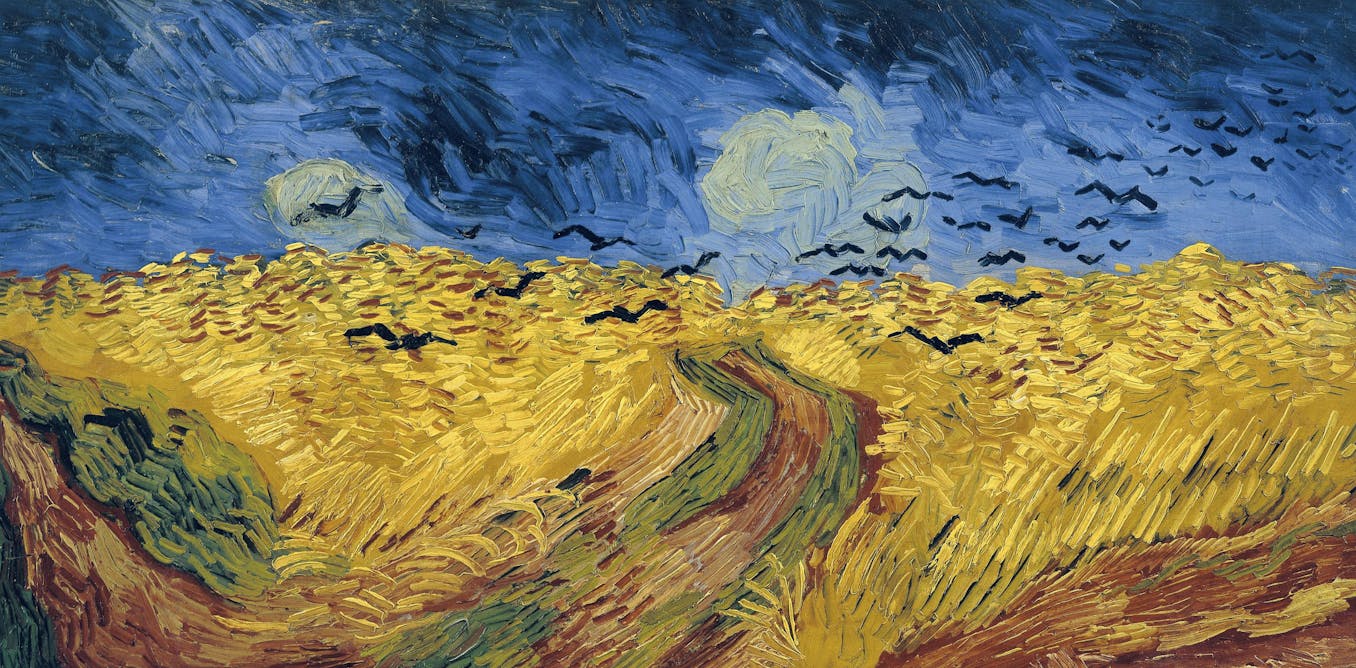 Personal Chair of Nineteenth-Century Art, History of Art, The University of Edinburgh Though he had spent the previous year at an asylum in Saint-Rémy-de-Provence in the south of France, Vincent van Gogh arrived in the village of Auvers-sur-Oise, just north of Paris, in an optimistic mood. It was here, in 1890, that he would spend the last few months of his life which, despite the depression that would soon return, were his most productive.
Continued here
|
 S40 S40Five books about the COVID pandemic to look out for in 2024   Vi-fi, short for virus fiction, describes contemporary fiction that features the devastating events of world-changing outbreaks and epidemics. Rooted in science fiction, vi-fi draws on bio-thrilling realism and parallel worlds with multiple, dystopian possibilities.Since 2020 there has been an exponential rise in vi-fi by a new COVID generation of authors who came out of isolation having experienced a pandemic in real time.
Continued here
|
 S41 S41New Fortnite-style recruitment video shows how UK armed forces are getting serious about prospects of Nato war with Russia   Anyone with teenagers in the house might have heard sounds from bedrooms that give the impression that a raid or heist is being orchestrated by a gang. In reality, they are probably fighting a war on their games console against other armies that might be made up of other kids from their street. Of course, it might just as easily be a foe from anywhere on the planet. This artificial environment, perhaps best exemplified at the moment by gaming company Roblox has overtaken the movies and music industries enjoyed by previous generations. So you can see why the army might want to attract attention for military games through recruitment videos that resemble the games young people play.
Continued here
|
 S42 S42UK press warns of Nato war with Russia - newspapers are clearly keen to avoid mistakes of WWII   “Britain must prepare for war. America won’t save us this time,” declared the headline on a column in the Daily Telegraph on January 19. The Daily Mail, meanwhile, asserted on January 18 that Nato is “braced for all-out war with Russia in the next 20 years”. It cited a Nato official’s advice that civilians should “prepare for cataclysmic conflicts and the chilling prospect of being conscripted”. The Sun has alerted its readers to the prospect of “wars in Russia, China, Iran and North Korea in five years”. In the Spectator, a recent column noted the defence secretary Grant Shapps’ assertion that the UK is “moving from a post-war to pre-war world” and suggested that “the west must stop playing Mr Nice Guy”.
Continued here
|
 S43 S43Economic crisis in Cuba: government missteps and tightening US sanctions are to blame   Cuba is going through its worst economic crisis in 30 years. Since 2020, Cubans have suffered falling wages, deteriorating public services, regular power outages, severe shortages and a growing black market. Hundreds of thousands of people have fled the country. Some place the blame for this desperate situation at the door of the Cuban government and its mismanagement of the economy. Others point to the damage caused by longstanding US economic sanctions that, to varying degrees, have been in place since 1962.
Continued here
|
 S44 S44The palm tree that lives beneath the rainforest floor   In the heart of western Borneo’s vibrant jungles, the edible fruits of the underground palm are well-known to the local people who snack on them. But this botanical marvel has remained unnoticed by the scientific community for so long because it flowers and bears fruit underground. At first glance, Pinanga subterranea, a rare palm tree, it looks like a small plant or seedling. Compared to a typical palm tree, Pinanga subterranea looks more modest and dainty, making it well-suited for smaller spaces or dense forests.
Continued here
|
 S45 S45Here's what happens to your body during plane turbulence - and how to reduce the discomfort it causes   This week has seen another barrage of unsettled weather sweep across the UK, with many flights delayed or cancelled. Some of those who were fortunate enough to take off found themselves arriving at destinations that weren’t on their boarding passes – such as passengers travelling from Stansted to Newquay who eventually diverted to Malaga.One thing that was consistently described by passengers was that parts of the flights and the attempted landings were some of the most unnerving they’d ever experienced, due to turbulence.
Continued here
|
 S46 S46People in the world's 'blue zones' live longer - their diet could hold the key to why   Ageing is an inevitable part of life, which may explain our strong fascination with the quest for longevity. The allure of eternal youth drives a multi-billion pound industry ranging from anti-ageing products, supplements and diets for those hoping to extend their lifespan. If you look back to the turn of the 20th century, average life expectancy in the UK was around 46 years. Today, it’s closer to 82 years. We are in fact living longer than ever before, possibly due to medical advancements and improved living and working conditions.
Continued here
|
 S47 S47 S48 S48 S49 S49As Pakistani election looms, the military maintains its grip on the country's politics   In the lead-up to upcoming general elections in Pakistan, the country’s Human Rights Commission has voiced significant concerns about “pre-poll rigging” and the “blatant manipulation” of the electoral process. Pakistan has a history of electoral engineering, with the military often playing a pivotal role as a “kingmaker.” This consistent military interference in Pakistani politics explains current fears about the integrity of the democratic process in the upcoming elections and beyond.
Continued here
|
 S50 S50A newly identified 'Hell chicken' species suggests dinosaurs weren't sliding toward extinction before the fateful asteroid hit   Were dinosaurs already on their way out when an asteroid hit Earth 66 million years ago, ending the Cretaceous, the geologic period that started about 145 million years ago? It’s a question that has vexed paleontologists like us for more than 40 years.At that crucial moment, what was really happening to dinosaur diversity? Discovery, identification and description of new dinosaurs provide vital clues. This is where our work comes in. Close examination of what we’d thought was a juvenile specimen of an already known species of dinosaur from this time period revealed that it was actually part of an adult from a completely new species.
Continued here
|
 S51 S51How Dostoevsky overcame his gambling addiction   Dostoevsky had to write The Gambler in two months. He had no choice. He had accepted 3,000 roubles from a publisher named Stellovsky to keep his creditors at bay. If he failed to deliver a work of not less than ten printer’s sheets (160 pages) by November 1, 1866, Stellovsky would receive the rights and income for all of Dostoevsky’s previous and future work for nine years. Dostoevsky broke off writing Crime and Punishment to take on the seemingly insurmountable task of completing a novel in such a sort period of time. He drew on his experience of being addicted to gambling.
Continued here
|
 S52 S52Prince Albert had nothing to do with the lyrebird bearing his name. Should our birds be named after people?   Influential ornithologist John James Audubon’s historical ownership of slaves has spurred a debate about bird names in the United States. As a result, the American Ornithological Society will change not only birds’ common names referring to him, but all 152 eponymous bird names in North America, regardless of good or bad perceptions of their namesakes. The cultural conversation has arrived in Australia where dozens of species are named after people. Some Australian scientists and birdwatchers (including one from the peak ornithological body Birdlife Australia) have proposed a review, particularly of names with colonial associations.
Continued here
|
 S53 S53How do I make sure my child's school backpack is safe and healthy?   As a new school year approaches, many families will be heading to the shops or to their school’s uniform store to buy backpacks. While children can have firm ideas about how their school bags look – and schools have practical requirements about what students need to carry – it is vitally important bags are also safe and healthy.
Continued here
|
 S54 S54Disaster communications can be more effective when using different messaging strategies   In the past two decades, disasters have left a devastating impact, claiming over a million lives and causing nearly US$3 trillion in global economic losses, according to the United Nations Office for Disaster Risk Reduction.When responding to disasters, disaster relief organizations (DROs) play a crucial role by mobilizing physical resources such as food and water to help impacted communities. During times of crisis, information resources are just as important as these physical resources. As such, DROs use social media to provide information rapidly and broadly to those that need it.
Continued here
|
 S55 S55Canada lags behind on efforts to address human rights abuses in seafood supply chains  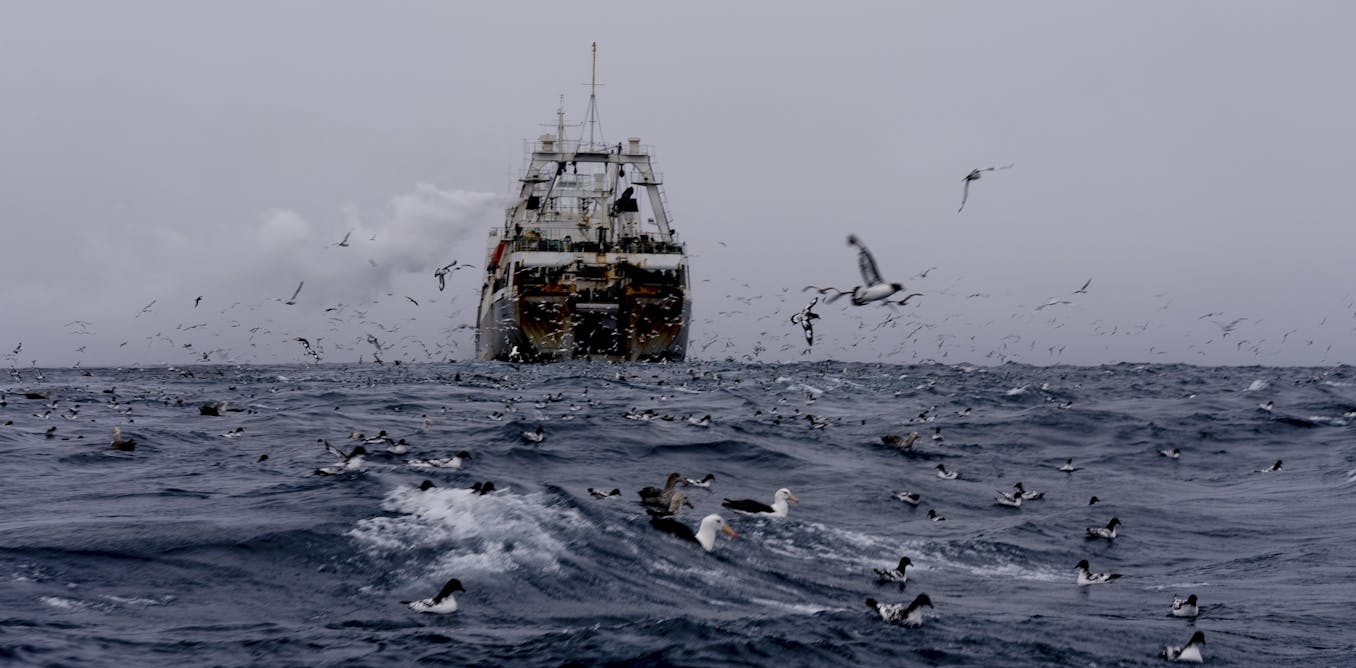 Seafood has become a source of concern for consumers who pay attention to the environmental and social impacts of what they buy. Climate change is adversely affecting ocean ecosystems, and a series of widely publicized scandals have exposed widespread illegal fishing and awful working conditions in both fishing and seafood processing.Seafarers in fishing often work 18 hours a day in what is widely considered to be the world’s most dangerous profession. Many are at sea for months or even years at a time, and most have no access to Wi-Fi. They are often excluded from labour laws and all are paid very low wages, despite producing food for high-income consumers.
Continued here
|
 S56 S56We want to hear from you: Please take our survey!  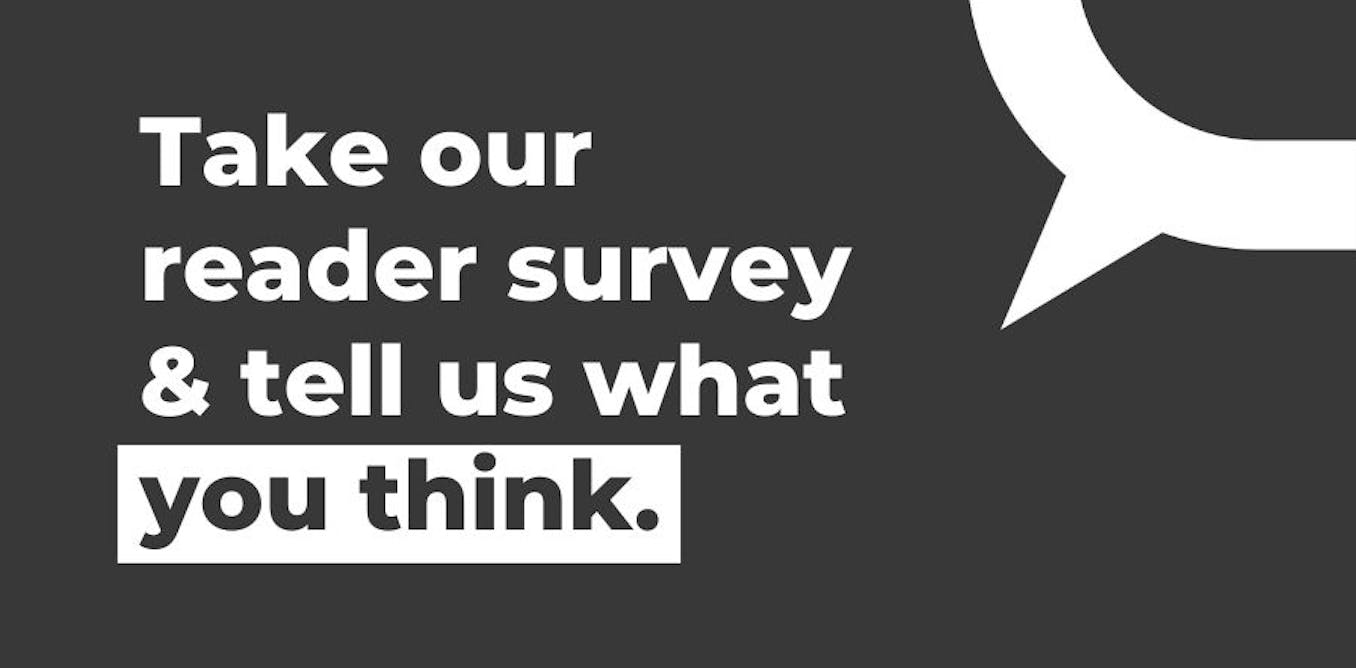 The Conversation Canada is in its seventh year, and we’re taking stock of a few things. You read us every day — now we’d like to hear from you! We hope you can take a few minutes to complete our survey of readers.Or copy and paste the URL below into your internet browser: https://www.surveymonkey.com/r/tcc2024
Continued here
|
 S57 S57Extreme heat can be risky during pregnancy. How to you look after yourself and your baby   As we face the continued effects of climate change, the frequency and intensity of heatwaves is increasing. We’ve recently learnt 2023 was the hottest year on record.Extreme heat presents a major public health threat. It can be especially dangerous for people who are socioeconomically disadvantaged, and people who have reduced physiological ability to adapt, such as older adults and those with certain medical conditions.
Continued here
|
 S58 S58 S59 S592024 is a huge year for the Olympics - and it's not just about the Paris games   2024 is a leap year, and in the world of international sport it means something very exciting: it’s an Olympic year. For Australians, there is growing excitement about the 2032 games to be held in Brisbane. And between those four-yearly stints, there is also the winter Olympics to keep us entertained.So let’s take a look at what’s coming up, and what it might mean for Australian athletes and audiences.
Continued here
|
 S60 S60 S61 S61 S62 S62Yes, it's getting more humid in summer. Here's why   Has Sydney felt more like Cairns lately? You’re not imagining it – millions of Australians up and down the east coast have sweltered through exceptionally high humidity in recent weeks. It’s due to normal weather patterns combined with a boost from global warming. Right now, the temperature of the sea surface is 1–3°C above normal for this time of year up and down the east coast. It’s particularly hot around the Queensland-New South Wales border and Tasmania’s east coast.
Continued here
|
 S63 S63Descendants of Holocaust survivors explain why they are replicating Auschwitz tattoos on their own bodies   Rony Cohen doesn’t remember any particular moment when she first became aware of the number tattooed on her grandmother’s arm. It was just always there. Cohen says she felt as if she had experienced the Holocaust herself, in a different cycle of her own life. It featured in her dreams. It permeated family life, as did the self-imposed interdiction on talking about the past and the absence of relatives. The legacy of starvation was never far from the surface. Food was used to soothe. There was no waste. Her grandfather finished every crumb from every plate.
Continued here
|
 S64 S64Why some descendants of Holocaust survivors choose to replicate a loved one's Auschwitz tattoo - podcast   Nearly eight decades on from the liberation of Auschwitz on January 27 1945, the number of concentration camp prisoners forcibly tattooed, remains, for many, the symbol of the Holocaust. The Nazis murdered six million Jews, one million of whom died at Auschwitz. Today, there are ever fewer survivors still alive to bear witness to this genocide. Now, some descendants of Holocaust survivors are replicating the Auschwitz tattoo of their parent or grandparent on their own bodies.
Continued here
|
 S65 S65 S66 S66The African Union is working on peace in Sudan: expert explains why it's in everyone's interests  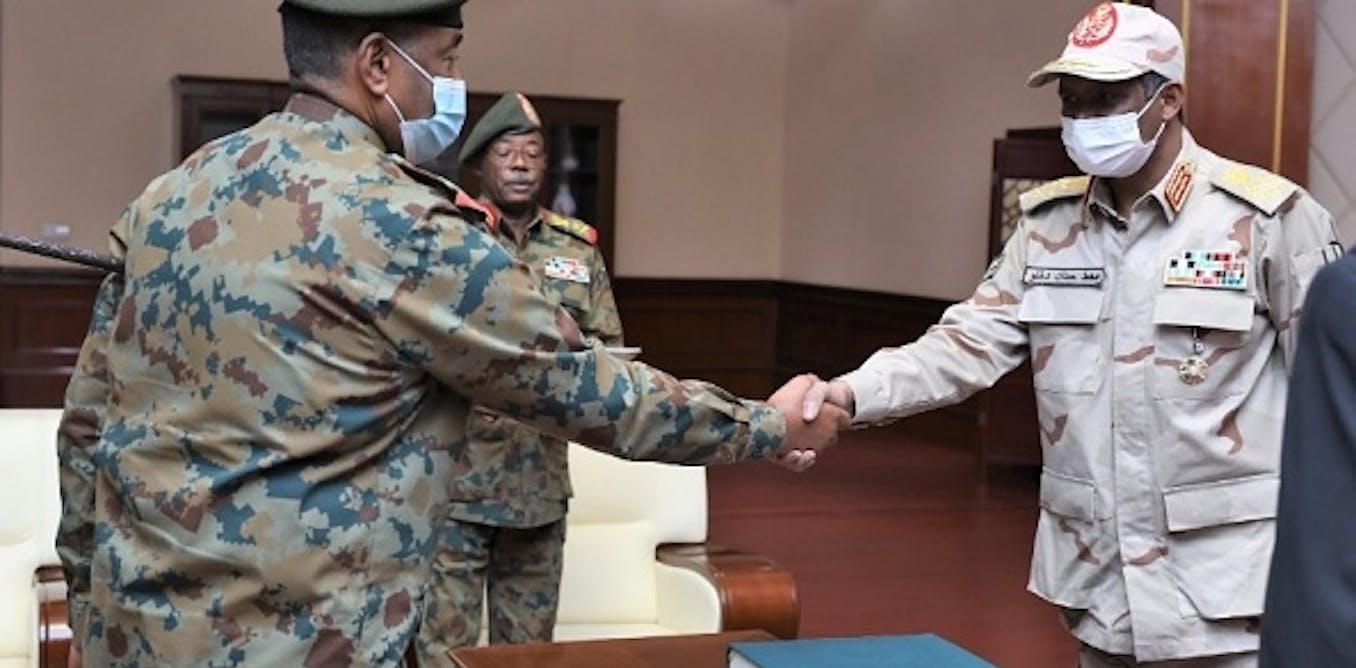 The African Union has recently named a team to work on a peaceful end to Sudan’s civil war. The team will engage Sudan’s feuding military factions alongside civil society and international players to resolve the conflict that has been raging since 15 April 2023. The AU’s High-Level Panel on the Resolution of the Conflict in Sudan is made up of Ghanaian diplomat Mohamed Chambas, former Ugandan vice-president Speciosa Wandira-Kazibwe and Mozambican diplomat Francisco Madeira. It has a mandate “to ensure an all-inclusive process towards the swift restoration of peace, constitutional order and stability” in Sudan.
Continued here
|
 S67 S67Ireland's asylum debate has turned violent thanks to the spread of misinformation and disinformation   The issue of asylum in Ireland has become increasingly contentious and fraught over the past year. Taoiseach Leo Varadkar has said arrests will be made after a spate of arson attacks against properties linked to housing asylum seekers. Protests have been held outside hotels and shelters across the country. And, notoriously, the riots that took place in Dublin in November 2023 were sparked by claims spread on social media that several violent stabbings in the city centre were carried out by an immigrant – who turned out to be a naturalised citizen.
Continued here
|
 S68 S68How the tide turned on transgender support charity Mermaids   The charity Mermaids, which offers support services to transgender young people and their caregivers in the UK, was once portrayed in the media as a respected source of advice and information. But by 2022, this had changed. Our recent study showed that negative attention to the charity peaked in 2022, a year that saw British newspapers regularly publishing stories that helped establish an image of Mermaids as a danger to young people.
Continued here
|
 S69 S69The Best Books Weâve Read in 2024 So Far   Our editors and critics choose the most captivating, notable, brilliant, surprising, absorbing, weird, thought-provoking, and talked-about reads. Check back every Wednesday for new fiction and nonfiction recommendations.This hypnotic novella, written in the nineteen-sixties but appearing only now in the U.S., takes place after a nuclear cataclysm, and is narrated by a man living in a luxury resort that has been converted into a sanctuary for the rich. "We bought the commodity called survival," he dryly notes, but, as the story unfolds and refugees stricken by radiation sickness pour in, the delusional nature of that notion becomes clear. Despite its brevity, the book is richly textured with insights about how money shapes one's conception of safety, and how grasping the interconnectedness of the physical world is also to grasp one's mortality. A resort guest imagines the radiation as light that "streamed out of every object; it shone through robes and skin and the flesh on the bones . . . suddenly to reveal the innermost, vulnerable marrow."
Continued here
|
 S70 S70Can an American Hold the United Arab Emirates Responsible for a Smear Campaign?   Foreign governments can generally spy on, steal from, or even kill Americans with impunity, at least in the eyes of U.S. courts. The Supreme Court recognized the long-standing common-law principle of sovereign immunity as early as 1812, when it ruled that Napoleon Bonaparte could keep an American schooner his navy had captured at sea and turned into a warship. (When damage forced it to dock in Philadelphia, the schooner’s former owners hurried to court to try to seize back their ship.) The idea was to avoid judicial interference in foreign relations while also shielding the U.S. from costly foreign court battles. Now codified as the Foreign Sovereign Immunities Act, passed in 1976, the doctrine has recently thwarted legal claims against Ethiopia for hacking and surveilling a dissident living in Silver Spring, Maryland; against Qatar for hacking and humiliating the Republican fund-raiser Elliott Broidy; against China for giving the world COVID-19; and against Saudi Arabia for the killing of Jamal Khashoggi, among many other examples.The same hurdle now stands before Hazim Nada, an American who fell victim to a shadowy campaign by the United Arab Emirates to destroy his profitable, Swiss-based oil-trading company—a story first told in The New Yorker last spring. About six years ago, Nada was puzzled to see a blizzard of bogus articles on blogs and in publications that linked him to terrorism or political Islam. His father, Youssef Nada, had once been a prominent figure in the Egyptian Muslim Brotherhood, but Hazim, who had visited Egypt only once, disdained politics and mostly rolled his eyes at his father’s Islamist zeal. As the scurrilous allegations multiplied, reputation-conscious banks cut off his company, Lord Energy. It quickly collapsed into bankruptcy, and only after its demise did Hazim learn the true story. An anonymous group who said that they were hackers showed him thousands of pages of e-mails and other files stolen from the computer systems of a Swiss private investigator, Mario Brero of Alp Services. The documents revealed that the U.A.E. had paid Alp millions of dollars for a successful multiyear disinformation campaign to put Nada out of business.
Continued here
|
 |
TradeBriefs Publications are read by over 10,00,000 Industry Executives About Us | Advertise Privacy Policy Unsubscribe (one-click) You are receiving this mail because of your subscription with TradeBriefs.
Our mailing address is GF 25/39, West Patel Nagar, New Delhi 110008, India |















































































































































































































